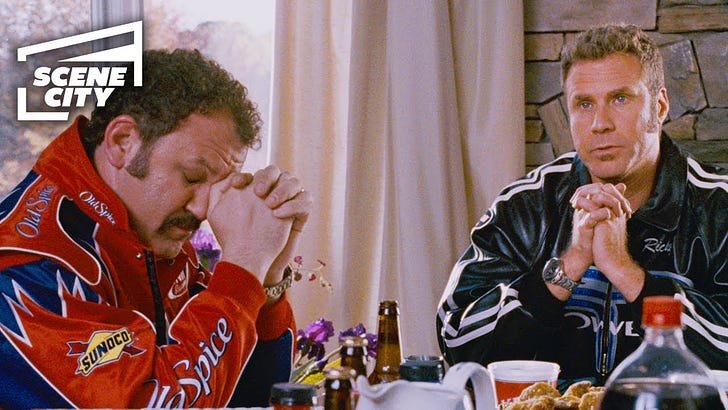Thanksgiving and its complications
Why Christian liturgy includes confession before thanksgiving
Today is Thanksgiving in the United States, and already the oven is warm with twice baked potatoes beginning their first round and the turkey, brined in the fridge, is ready for its slow roast. Thanksgiving is among the least commercial of our holidays, with little shopping attached to it apart from food, and given its simple central act, I’m hesistant to complicate things. What could be wrong with saying thanks?
I’ll leave aside the problematic history that brought about this holiday. There’s plenty to explore there, and it certainly intersects with what I want to say here, but I want to keep this post relatively short and there’s too much to unpack there. Instead, I want to point you to one of the finest theological statements of modern cinema: the dinner prayer scene of Taledega Nights.
In the scene, Ricky Bobby is giving thanks at a dinner table spread with KFC, Dominos, and Taco Bell, among many other things. Watch and laugh, it’s comic genius, but then notice the truth in the parody of prayer.
What is revealed in Ricky Bobby’s blessing is that there is something absurd about thanking God (albeit in the form of “Baby Jesus”) for a “bountiful harvest” of fast food. And the reality is that at many a Thanksgiving table this holiday, saying thanks for the food will not be without its problems. It doesn’t take much reflection to think of all the exploitations that brought the average American meal to the table—the farm workers living in wage slavery, the animals treated as mere products of industry, the soil depleted through the assaults of chemical agriculture—there is much to mourn over at most meals.
I first began thinking about this truth after reading the theologian Kelly Johnson’s brilliant book The Fear of Beggars: Stewardship and Poverty in Christian Ethics. In that book, Johnson interogates the rise of language in Christian ethics about stewardship. Stewardship, she argues, isa fairly novel term in the theological vernacular, one that came to prominence alongside industrial capitalism. Johnson argues that placing stewardship as the primary mode of thinking about proper use of wealth and resources goes against the much older theological tradition of praising poverty. In the early days of Christianity those who gave away all their wealth in order to be poor were praised, while in our contemporary theology we praise those who are good stewards of what “God has given them.” This puts those who have little to steward in a marginal place while it elevates those who have resources and wealth to the center of ethical action. “Blessed are the wealthy, for they have much to steward,” goes the modern logic.
Johnson points out that along with our move toward praising stewardship Christian ethical thinking has also abandoned the concept of “filthy lucre.” Filthy lucre, of course, is the gaining of wealth by problematic means. Christians, for instance, would not want to gain wealth from pornography or gambling. But what about fossil fuel investments? What about having stock in a fund that includes private prisons or weapons? The fact is that for the average investor with a 401(k) or other retirement plan, we simply don’t know what our money is invested in other than that it hopefully brings us profits.
This is problematic, in terms of money, but even our basic use of the world is troubled. I’m typing this on a computer, putting it out on the web, where you will read it from the cloud. This is a terribly energy intensive reality. There are server banks churning across the world to make it possible, and no matter how “green” the energy is that makes it possible, all industrial energy is produced through the means of an extractive economy.
We are entangled in these realities and we must work to do what we can to get out. But in the meantime, we need to confess before we say thanks. This is the pattern of Christian liturgy and it is a wise one. The liturgy of the Eucharist is called “The Great Thanksgiving.” In it we offer our gratitude for the saving work of God and the coming of Christ to be with us, not only in the act of the Incarnation, but also in the bread and wine, body and blood, that joins us to Christ’s presence. And yet, before we get to this act of Thanksgiving, we confess our sins against God and our neighbor.
This Thanksgiving, such an act of confession, is a worthy act. I’m not saying that you lead the table in a mass lament, a round of genuflections and wails before the turkey is carved. Instead, it is simply good to acknowledge within yourself that for all that you are thankful for, there are wrongs that accompany our life in the world, even those things we might call our blessings. And as with the Great Thanksgiving, our call is to look forward to that day when we can say our thanks without any hesitation or qualification, a pure thanksgiving with no other confession than the greatness of God.
So whether you are an American at the dinner table today, or a friend in another place offering your own act of gratitude, let us acknowledge the wrongs that acompany so many of the goods of our lives. And let us work for that world where we can say thanks, simply, with no complications of conscience. In the end, even for all our wrongs, we cannot undo the gifts of God that are present in all the goods of our lives. For that we can give thanks, even if it comes in the form of “the bountiful harvest of Dominos, KFC, and the always delicious Taco Bell.”




Thank you for this.
"... let us acknowledge the wrongs that acompany so many of the goods of our lives."
Exodus 28:38 ...the iniquity of our most sacred things